At least 10 Nigerian states collectively increased their domestic debt stock by ₦417.7 billion year-on-year, despite receiving significantly higher allocations from the Federation Account Allocation Committee (FAAC). This is according to an analysis of subnational debt data from the Debt Management Office (DMO) for Q1 2025.
The affected states—Rivers, Enugu, Niger, Taraba, Bauchi, Benue, Gombe, Edo, Kwara, and Nasarawa—raised their combined domestic debt from ₦884.9 billion in Q1 2024 to ₦1.3 trillion in Q1 2025, representing a sharp 47.2% increase within one year.
Quarter-on-quarter figures also show an uptick. The states’ collective domestic debt rose from ₦1.26 trillion in Q4 2024 to ₦1.30 trillion in Q1 2025, amounting to an additional ₦42.3 billion or a 3.4% increase in just three months.
This growing indebtedness comes at a time when FAAC allocations to states have surged—bolstered by higher oil prices, the devaluation of the naira, and revenues freed up from the removal of petrol subsidies.
However, rather than using these improved inflows to settle existing obligations or reduce fiscal pressure, several states appear to be accelerating their borrowing, raising fresh concerns over fiscal prudence and the long-term sustainability of public finances at the subnational level.
Experts warn that if left unchecked, this trend could increase the risk of debt distress and limit states’ ability to fund essential infrastructure and social services.















